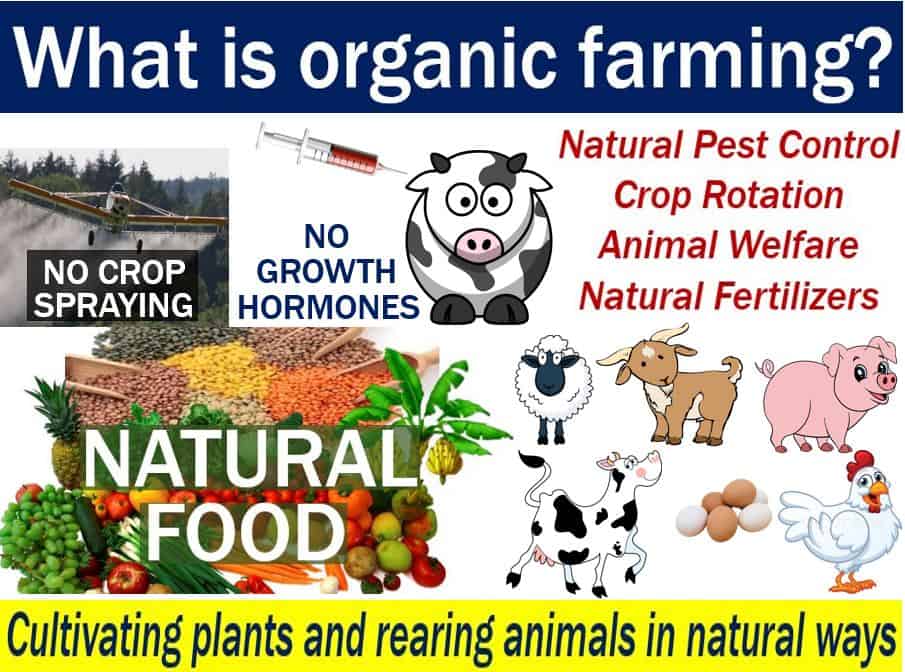Organic farming or low input farming refers to livestock or vegetable production using natural sources, nutrients, and methods. We also call it organic agriculture. Organic farming relies upon natural forms of farming such as crop rotation and biological pest control. Biological pest control includes, for example, using ladybugs (UK: ladybirds) which eat aphids, rather than spraying crops with artificial pesticides.
Organic farmers do not routinely administer antibiotics to their animals. Conventional farmers, however, do.
Organic farmers grow and sell organic food.
There is more to organic farming than simply choosing not to use artificial fertilizers, pesticides, or genetically-modified organisms. It is a holistic system which optimizes the productivity and fitness of diverse communities within the agro-ecosystem.
The Food and Agriculture Organization of the United Nations (FAO) says the following regarding organic agriculture:
“It is a system that begins to consider potential environmental and social impacts by eliminating the use of synthetic inputs, such as synthetic fertilizers and pesticides, veterinary drugs, genetically modified seeds and breeds, preservatives, additives, and irradiation.”

Organic farming is more expensive
Organic farming is less efficient than intensive farming. Therefore, organic produce costs more.
Demand for organic fruit, vegetables, and meats is increasing rapidly in many countries. However, when people’s incomes drop, as may occur during a recession, they revert to non-organic produce.
Organic foods are generally more expensive than other foods for several reasons. Organic farms are typically smaller than conventional, highly-intensive ones. Below are some more reasons explaining why organic farming is more expensive.
Crops take longer
Crops, on average, take longer to grow because organic farmers do not use artificial chemicals. For their livestock, they do not use growth hormones.
Therefore, for example with crops, organic farmers cannot get as many harvests in a given period as conventional farmers.
Organic farming – crop rotation
To keep the soil healthy, organic farmers conduct a crop-rotation system. Crop rotation also helps prevent weed growth.
This means that some parts of an organic farm are not producing things the farmer can sell. Instead, those fields grow ‘cover crops’ which add nutrients, such as nitrogen to the soil.
Conventional farmers use every inch of their land all the time. They use artificial fertilizers to help feed their crops.
Animal welfare
In organic farming, animal welfare is a top priority. Animal welfare costs money.
For example, keeping 10,000 egg-laying hens in batteries is much cheaper than raising free-range poultry.
Not only are the running costs higher, but also the capital costs. To house 10,000 free-range hens, you need at least ten times more land than you do for battery hens. Land costs money.
The Environmental Impact of Organic Farming
Organic farming is also environmentally friendly. It helps maintain soil health, reduce soil erosion, and decrease the amount of toxins in our food and environment.
By abstaining from synthetic fertilizers and pesticides, organic farms reduce the risk of groundwater contamination, promote biodiversity, and limit exposure to harmful chemicals. Biodiversity refers to the variety and variability of life on Earth.
Such farming practices aid in sequestering carbon, i.e., keeping carbon dioxide that would have gone into the atmosphere in the soil, thus combating climate change.
Put simply, embracing organic methods is not only good for our immediate health but also crucial for preserving our planet for future generations.
A short history of the term ‘organic farming’
The term ‘organic farming’ started gaining prominence in the English language in the early twentieth century.
Sir Albert Howard (1873-1947), a British botanist, is often referred to as ‘the father of organic farming.’ He was instrumental in promoting the principles of organic farming. His book, ‘An Agricultural Testament,’ published in 1940, is considered one of the foundational texts of organic agriculture.
However, nobody knows for sure whether he was the first person to use the term.
